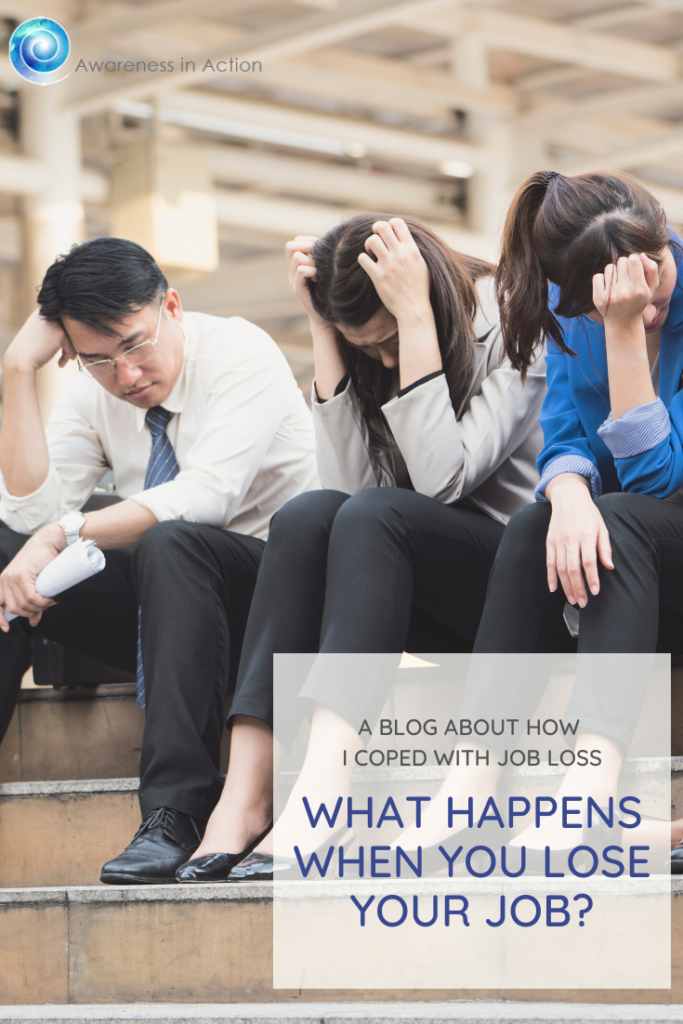I have had one major incident of job loss in my career. It was messy and painful. Although it happened years ago, I can still wake up in the night and wonder what on earth happened. I wasn’t fired but made redundant, although the difference felt like semantics. The experience left me feeling disorientated, lonely and inadequate.
For most of us, losing a job means a scramble to find another one as soon as possible. The bills that need paying do not stop with job loss. My own solution was to become a solo entrepreneur, which involved a steep learning curve. There is very little time left to care for how wounded, low and discarded one can feel.
Here are some of the issues that I tried to work with while setting up my new business.
Who was I after my job loss?
My job had been in senior management in an international non-profit. I travelled a lot, I had teams who answered to me—I was a boss. When it was over there was a short period of time where I was completely disorientated. For so many years I had worked very hard and focused my energy on my work. Without it I was not sure who I was.
It took me a while to consciously disconnect myself from the job that I had had. I needed to remember why I wanted the job in the first place, and to re-connect with the motivation that led me to carry it out for so long. Slowly, painfully it became possible to remember interests that I had dropped through lack of time before my job loss. My meditation practice, which had become minimal during the busiest times, flourished again. The space it helped to open up enabled me to process what I was feeling in a way that was healing.
Struggling with a sense of shame
Brené Brown describes shame as the intensely painful feeling or experience of believing that we are flawed and therefore unworthy of live and belonging—something we’ve experienced, done, or failed to do makes us unworthy of connection.
That seems pretty accurate. I certainly felt that I had failed and become somehow lesser in people’s eyes. Indeed, by not being able to avoid job loss I had failed in my own eyes. However, much worse was the idea that people would think that as a failure I was not someone they would want to know. Not being able to explain to myself what had gone wrong made it very hard to explain to other people. I felt defenceless.
That was the place from which I set out to build the next phase of my working life.
Major cracks in my self-confidence
Perhaps it is inevitable that when you suffer a job loss you are precipitated into an intense period of self-examination. There’s nothing wrong with that. It’s a good idea to take time to reflect on your work habits and how you are coping with your working life.
The trouble comes when, hurting from the shock of losing your job, you forget all about how to be kind to yourself. I have had friends who have been made redundant or lost their job who have turned to me for help. I have never subjected any of them to the tirade of judgment and criticism that I poured out to myself.
Self-compassion was not so well known at the time that I lost my job. As part of my work now I have studied it quite thoroughly and wish that I had known more about it at the time. Learning how to tame the sharp voice of my inner critic and to change oneself through kindness would have helped me enormously. Understanding that my job loss was not something that only happened to me but was happening to many other people at the same time would have taught me a great deal.
Fear of what my job loss meant for the future
Underneath everything else there was the constant worry of not being able to get more work. The threat of financial difficulties was a constant drain on my energy. Working with that fear became a priority because when it got too intense, I froze.
Fortunately, we often have more resilience than we think. As much as I could, I used the fear to cut through my feelings of inadequacy and to spur me on.
The loss of community
One thing that I had not anticipated was how much I missed the people that I had worked with. People that I had worked with for years and seen every day simply dropped out of my life. Gone was the flow of ideas and the shared camaraderie.
When you work with other people there is a ready-made social network. Of course, you are joined together by the work you are doing but you also share all kinds of other things. You hear news of what is going on in other people’s lives. There is an audience for you to share what is going on in your’s. You accompany each other through all kinds of moods, challenges and accomplishments.
With a job loss, all this is gone in a moment.
Struggling with the sympathy of friends and family
My friends and family were kind and sympathetic, but I found it hard to be the one needing support. I am more used to offering it. Too often I found myself putting on a brave face when actually I felt really low. In fact, it was a journey for me to allow my vulnerability to show and to accept their support with gratitude.
However much we may need to move on after a job loss and find new work, we need time to grieve. Yes, it’s uncomfortable and it takes time but without it we are denying ourselves the opportunity to learn from what has happened to us. In order to move on in a good way, we need to be able to make some sense of what has happened. How we heal the pain of our loss will depend on being able to take the time for reflection, and evaluation. Job loss is one of the most stressful experiences we will face but it is also a time of opportunity. We need to give ourselves the gift of that time.

I hope you enjoyed this post. I am currently designing an online course to support people through job loss. If you could fill out my survey it would help me to gather data for the online course. It will only take you 10 minutes. Thank you so much!


